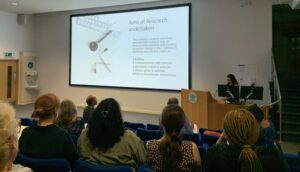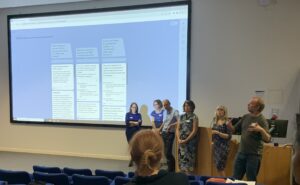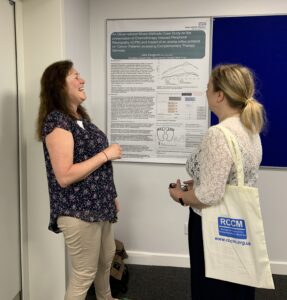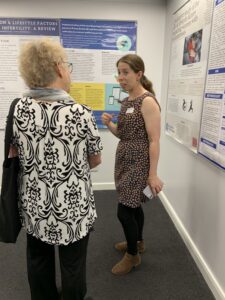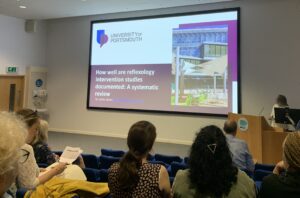Summary of the RCCM 2023 Conference, by Ava Lorenc
Karen Pilkington’s keynote on her adventures with evidence was fascinating and inspiring, and at some points laugh out loud. It was great to reflect on just how far the CAM evidence base has come since the early days of evidence-based-medicine, when innovations included a PC on a trolley being wheeled around ward rounds!
The oral presentations covered a wide range of topics including effectiveness and implementation of CAM, behaviour change and self-management, and CAM in practice, guidelines and integration. There is no way to do justice to the wealth of research presented in this summary, but some highlights for me included:
- A-la Park highlighting the need for cost-effectiveness studies in CAM (and offering to collaborate on these, as a highly sought after health economist)
- The importance of how interventions are reported in CAM studies, which is a currently neglected area, as Jackie James explained regarding reflexology
- The role of lifestyle and behaviour change in CAM interventions, as discussed by both Jo Rochford and Jonquil Pinto
- Developments in integration of CAM into the NHS, including Beverley DeValois’ important work on guidelines in integrative oncology, and Klara Dolakova’s view of integration through an ethical lens.
The poster presentations were fantastic and the presenters did so well to summarise their work in a quickfire 3 minute slot. The prize judging was particularly challenging this year as they were all of such high quality. Lovely to see so many students presenting their work.
Graeme Donald and John Hughes led a discussion about feasibility and pilot studies, which is a really hot topic in CAM at the moment. RLHIM are leading this field with many studies conducted or underway. We had a heated debate about the difference between feasibility and pilot studies, and Graeme highlighted his paper on this topic, and that RfPB encourage feasibility and pilot studies for funding of up to £250,000. RCCM members considering a feasibility study are encouraged to get in touch with us.
We were delighted to award two prizes from the day:
- Best oral presentation was awarded to Jo Rochford from NCA for her work on “The potential for Acupuncture Practice to Influence Behaviour Change in Patients: A Grounded Theory Study”
- Best poster was awarded to Rachael Frost from UCL for “Over-the-counter products for depression, anxiety and insomnia in older people: A scoping review”
Although not awarded a prize, the second highest scoring poster and oral were for delegates from the University of Worcester, who contributed a number of excellent presentations to the conference.
The final Q&A panel discussion covered diverse issues including:
- The need for research showing how CAM could fill the gaps where conventional medicine struggles to be effective – watch this space for an RCCM project on this
- How the field should move on from pilot studies, and the need for better dissemination and a database of CAM pilot studies to enable development and progression rather than duplication
- The importance of educating CAM practitioners in research and how important it is, and medical students in CAM.
- Alternative RCT designs including n of 1 and pragmatic/complex intervention/non pharmacological studies.
- The importance of continuing to encourage collaboration between practitioners and researchers
- The need to evaluate lifestyle medicine.
Finally, John Hughes reminded us:
- If you would like to join the RCCM please visit www.rccm.org.uk/join
- RCCM members are eligible to apply for the George Lewith prize https://www.rccm.org.uk/about-us/awards/
